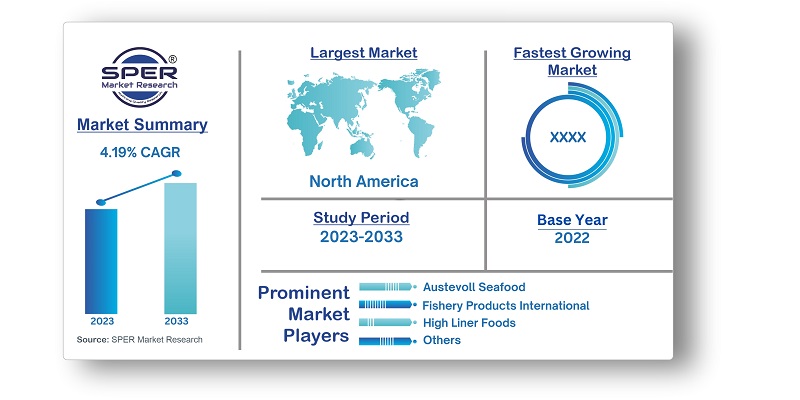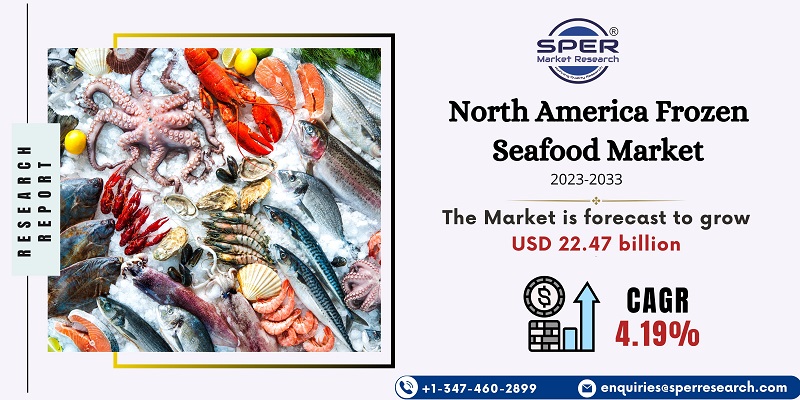
North America Frozen Seafood Market Growth, Size, Trends, Demand, Revenue and Future Outlook
North America Frozen Seafood Market Size- By Type, By Distribution Channel, By Sector- Regional Outlook, Competitive Strategies and Segment Forecast to 2033
| Published: Jan-2024 | Report ID: FOOD2403 | Pages: 1 - 154 | Formats*: |
| Category : Food & Beverages | |||
- June 2022: In order to fulfill the growing demand for its premium seafood, High Liner Foods Inc. made renovations and reinvested in its Newport location.
- May 2022: Trident Seafood Corporation intends to replace its Akutan facility with a "next-generation processing plant" in Alaska's Aleutian Islands. The facility can now produce more surimi and recover higher volumes of secondary products like pollock, roe, fishmeal, and fish oil.


| Report Metric | Details |
| Market size available for years | 2019-2033 |
| Base year considered | 2022 |
| Forecast period | 2023-2033 |
| Segments covered | By Type, By Distribution Channel, By Sector |
| Regions covered | Central Region, Southern Region, Northern Region. |
| Companies Covered | Austevoll Seafood, Fishery Products International, High Liner Foods, Nufarm Ltd, Iglo Group, Leroy Seafood, Marine Harvest, and others. |
- Consumers
- Retailers
- Food Service Industry
- Food Processing Companies
- Supply Chain Partners
| By Type: |
|
| By Distribution Channel: |
|
| By Sector: |
|
- North America Frozen Seafood Market Size (FY’2023-FY’2033)
- Overview of North America Frozen Seafood Market
- Segmentation of North America Frozen Seafood Market By Type (Adjuvants, Fertilizers, Pesticides, Plant Growth Regulators)
- Segmentation of North America Frozen Seafood Market By Distribution Channel (Supermarkets and Hypermarkets, Speciality, Convenience Stores, Online, Others)
- Segmentation of North America Frozen Seafood Market By Sector (Retail, Institutional.)
- Statistical Snap of North America Frozen Seafood Market
- Expansion Analysis of North America Frozen Seafood Market
- Problems and Obstacles in North America Frozen Seafood Market
- Competitive Landscape in the North America Frozen Seafood Market
- Impact of COVID-19 and Demonetization on North America Frozen Seafood Market
- Details on Current Investment in North America Frozen Seafood Market
- Competitive Analysis of North America Frozen Seafood Market
- Prominent Players in the North America Frozen Seafood Market
- SWOT Analysis of North America Frozen Seafood Market
- North America Frozen Seafood Market Future Outlook and Projections (FY’2023-FY’2033)
- Recommendations from Analyst
1.1. Scope of the report1.2. Market segment analysis
2.1. Research data source
2.1.1. Secondary Data2.1.2. Primary Data2.1.3. SPER’s internal database2.1.4. Premium insight from KOL’s
2.2. Market size estimation
2.2.1. Top-down and Bottom-up approach
2.3. Data triangulation
4.1. Driver, Restraint, Opportunity and Challenges analysis
4.1.1. Drivers4.1.2. Restraints4.1.3. Opportunities4.1.4. Challenges
4.2. COVID-19 Impacts of the North America Frozen Seafood Market
5.1. SWOT Analysis5.1.1. Strengths5.1.2. Weaknesses5.1.3. Opportunities5.1.4. Threats5.2. PESTEL Analysis5.2.1. Political Landscape5.2.2. Economic Landscape5.2.3. Social Landscape5.2.4. Technological Landscape5.2.5. Environmental Landscape5.2.6. Legal Landscape5.3. PORTER’s Five Forces5.3.1. Bargaining power of suppliers5.3.2. Bargaining power of buyers5.3.3. Threat of Substitute5.3.4. Threat of new entrant5.3.5. Competitive rivalry5.4. Heat Map Analysis
6.1. North America Frozen Seafood Market Manufacturing Base Distribution, Sales Area, Product Type6.2. Mergers & Acquisitions, Partnerships, Product Launch, and Collaboration in North America Frozen Seafood Market
7.1. North America Frozen Seafood Market Value Share and Forecast, By Type, 2023-20337.2. Shrimp7.3. Salmon7.4. Tuna7.5. Tilapia7.6. Pangasius7.7. Catfish7.8. Others
8.1. North America Frozen Seafood Market Value Share and Forecast, By Distribution Channel 2023-20338.2. Supermarkets and Hypermarkets8.3. Speciality8.4. Convenience Stores8.5. Online
9.1. North America Frozen Seafood Market Value Share and Forecast, By Sector 2023-20339.2. Retail9.3. Institutional
10.1. North America Frozen Seafood Market Size and Market Share
11.1. North America Frozen Seafood Market Size and Market Share By Type (2019-2026)11.2. North America Frozen Seafood Market Size and Market Share By Type (2027-2033)
12.1. North America Frozen Seafood Market Size and Market Share By Distribution Channel (2019-2026)12.2. North America Frozen Seafood Market Size and Market Share By Distribution Channel (2027-2033)
13.1. North America Frozen Seafood Market Size and Market Share By Sector (2019-2026)13.2. North America Frozen Seafood Market Size and Market Share By Sector (2027-2033)
14.1. North America Frozen Seafood Market Size and Market Share By Region (2019-2026)14.2. North America Frozen Seafood Market Size and Market Share By Region (2027-2033)14.3. Central Region14.4. Southern Region14.5. Northern Region
15.1. Austevoll Seafood15.1.1. Company details15.1.2. Financial outlook15.1.3. Product summary15.1.4. Recent developments15.2. Fishery Products International15.2.1. Company details15.2.2. Financial outlook15.2.3. Product summary15.2.4. Recent developments15.3. High Liner Foods15.3.1. Company details15.3.2. Financial outlook15.3.3. Product summary15.3.4. Recent developments15.4. Nufarm Ltd15.4.1. Company details15.4.2. Financial outlook15.4.3. Product summary15.4.4. Recent developments15.5. Iglo Group15.5.1. Company details15.5.2. Financial outlook15.5.3. Product summary15.5.4. Recent developments15.6. Leroy Seafood15.6.1. Company details15.6.2. Financial outlook15.6.3. Product summary15.6.4. Recent developments15.7. Marine Harvest15.7.1. Company details15.7.2. Financial outlook15.7.3. Product summary15.7.4. Recent developments15.8. Others
SPER Market Research’s methodology uses great emphasis on primary research to ensure that the market intelligence insights are up to date, reliable and accurate. Primary interviews are done with players involved in each phase of a supply chain to analyze the market forecasting. The secondary research method is used to help you fully understand how the future markets and the spending patterns look likes.
The report is based on in-depth qualitative and quantitative analysis of the Product Market. The quantitative analysis involves the application of various projection and sampling techniques. The qualitative analysis involves primary interviews, surveys, and vendor briefings. The data gathered as a result of these processes are validated through experts opinion. Our research methodology entails an ideal mixture of primary and secondary initiatives.



Frequently Asked Questions About This Report
PLACE AN ORDER
Year End Discount
Sample Report
Pre-Purchase Inquiry
NEED CUSTOMIZATION?
Request CustomizationCALL OR EMAIL US
100% Secure Payment






Related Reports
Our Global Clients
Our data-driven insights have influenced the strategy of 200+ reputed companies across the globe.




















